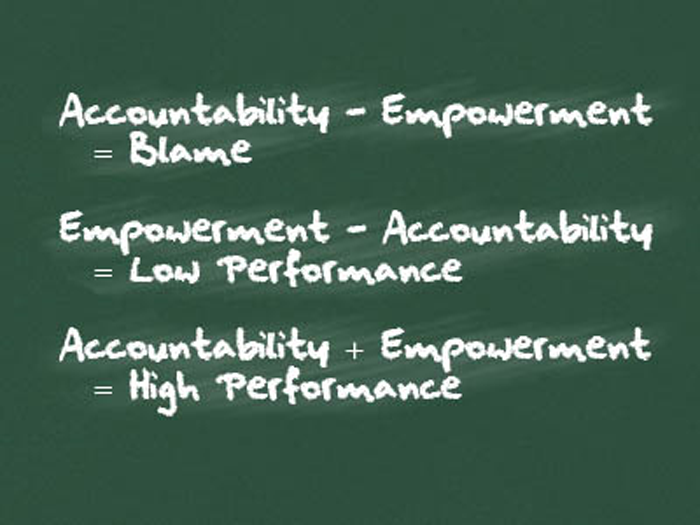Empowerment Through Accountability
It seems to me that everyone wants to be empowered in the workplace, to be in charge of their domains, their destiny, and to make independent decisions. But when things go wrong, what system is in place to hold them accountable? You can't successfully empower others without having a system to hold them accountable for their decisions and actions. Organizations that fail to put a system that communicates consequences in place, have inadvertently created a culture of dependency where employees are dependent on managers and leaders to dictate direction. When this happens, you've now created an unengaged employee culture and an unengaged employee is one that will leave and/or is unproductive. It is shown that up to $11 billion is lost annually due to employee turnover (Bureau of National Affairs) and engaged employees outperform those who aren't by up to 202% (Gallup Poll).
What to do
Empowerment by definition means to give power, or in the case of a manager, let go of power to someone else. With today's diverse workforce, we are seeing a growing number of individuals who want to have power (1 of 4 ways to be engaged) and it's our responsibility to determine what that power looks like and how much to give. To hold them accountable, you need to create a framework that set roles, responsibilities, and expectations (my favorite).
How to do it
We do that by defining what their role is within the team, what responsibilities they have, and what our expectations are for performance and outcomes. We also do this by providing a vision, direction, and support to ensure the person has what they need to be successful. We show them they are valued as true contributors and what their impact is on their work. We communicate with them, demonstrate the behaviors we want, and provide feedback.
So once we've done this part of the process, we then need to decide the key elements of accountability. After all, we can't just give away power without having some guarantee of return performance. To do this we follow these steps:
- Define accountability.
- Accountability means "the quality or state of being accountable... an obligation or willingness to accept responsibility or to account for one's actions" (Merriam-Webster). Therefore by definition, personal accountability is assumed by the person who wants power.
- Clarify your expectations and the impact accountability will have on the team and customers.
- Setting expectations should open lines of communication and enable the team to have an open dialog on what appropriate responsibilities and outcomes are for each person and agree on a set of expectations. From this, it should be visible what the impact will be to the team and customers.
- Explain the consequences associated with accountability.
- If the person isn't meeting expectations or isn't taking responsibility for their actions, what will the consequences be? Typical organizations will have a performance improvement system or disciplinary process for the manager to use if necessary.
- Identify those individuals who have a high level of personal accountability.
- These are the employees who will set the stage. They will be the ones who demonstrate a high degree of self-awareness, values, and demonstrates excellence in their work. These are the ones who will model the right behaviors to create the cultural change in setting higher expectations.
Outcome
Environments that have a solid accountability system in place and have a high level of personal accountability among its employees, will also have a culture of empowerment where those individuals will feel they have some (or complete) control over their destiny. By providing opportunities to be empowered, we are also engaging our workforce in what they are doing, but the outcomes of their work. Merely empowering a person without any responsibility or accountability is quite useless, not to mention what a catastrophe it can be to the manager. Achieving a high level of empowerment through accountability is the cornerstone to an innovating, learning, and adapting organization. It is also the foundation for high-performing teams that feel in control, are motivated and inspired to greatness.
© Darrielle Ehrheart | July 12, 2015
Resources:
Horsfall, G. A. (1996). Accountability: The force behind empowerment. Hospital Material Management Quarterly, 18(2), 26-31.
Cohen, S. (2013, September) The Realities of Accountability. Nursing Management. 44(9):26-28.
